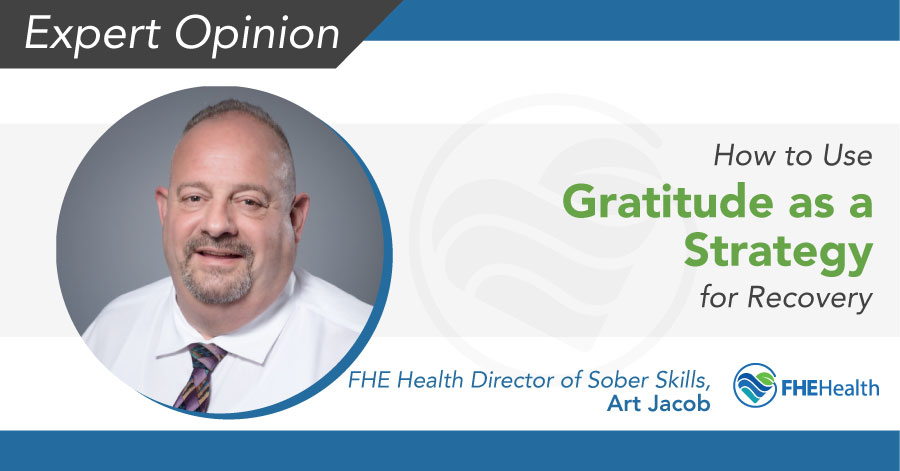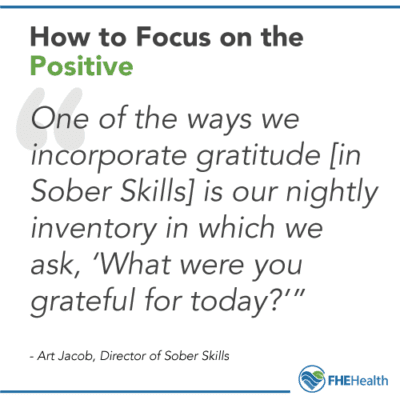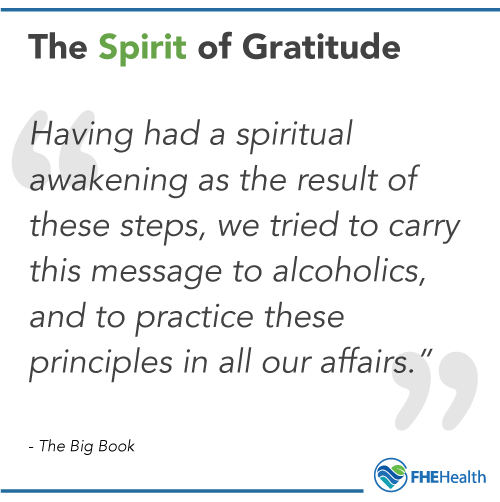
It is now widely known that gratitude can make people happier. For example, research cited by Harvard has linked gratefulness and an attitude of acknowledging the gifts in one’s life to numerous mental health benefits. Among them: reductions in sadness and symptoms of depression, better relationships, greater emotional resilience, and more positive emotions.
But what about gratitude in sobriety? Can gratitude serve as a useful tool or strategy for people in early recovery? The answer is “yes,” according to Director of Sober Skills Art Jacob and his colleague Michael Peerbolte, who facilitates 12-step groups in the program. (The Sober Skills program is a 12-step-based aftercare program for men who have completed rehab but need an additional level of support as they transition back into the real world.) In a recent interview, they shared how showing gratitude in recovery can boost sobriety and resilience to relapse.
Why Gratitude Is Important to Recovery
 “Gratitude is a byproduct of internalizing the 12 steps,” Jacob said. While the Big Book does not explicitly address why gratitude is important to recovery or offer tips for how to use it as a strategy, the Big Book includes stories of real people who have found recovery by practicing the 12 Steps— and these stories brim with gratitude. In this sense, gratitude is implicit in 12-step recovery.
“Gratitude is a byproduct of internalizing the 12 steps,” Jacob said. While the Big Book does not explicitly address why gratitude is important to recovery or offer tips for how to use it as a strategy, the Big Book includes stories of real people who have found recovery by practicing the 12 Steps— and these stories brim with gratitude. In this sense, gratitude is implicit in 12-step recovery.
This also helps to explain why “gratitude is one of the buzz words at just about any AA meeting,” in Peerbolte’s words. He said that it’s common practice to have “topic meetings” with a “chairperson who introduces something to discuss, and about 50 percent of the time the topic is gratitude.”
A common theme for discussion in AA meetings, according to Jacob? “An attitude of gratitude will keep you sober” or themes along these lines— the whole philosophy behind it is that “if you’re looking at your blessings, you won’t go to the negative.”
In other words, focusing on what you can be grateful for can help to insulate you from the old resentments and negative emotions that probably drove you to drink or use drugs in the first place.
Exploring Gratitude in Recovery – 4 Gratitude Exercises That Can Help Recovery
In addition to attending AA meetings where gratitude is often the object of discussion, Jacob and Peerbolte recommended the following gratitude exercises as tools that can help people in early recovery stay sober:
Nightly Inventory of Day’s Blessings
“One of the ways we incorporate gratitude [in Sober Skills] is our nightly inventory in which we ask, ‘What were you grateful for today?’” That’s Jacob. He shared how, during this nightly group wrap-up of the day, every member gets a turn to say what they were thankful for that day. These thanksgivings can be small and even mundane, as illustrated by these examples of things that clients give thanks for in their day:
- I’m grateful my roommate is cooking spaghetti.
- I’m grateful that I liked the speaker at the meeting tonight.
- I’m grateful for Monday night football.
The point of the exercise is not about what you’re giving thanks for. The point of the exercise is that you’re giving thanks. “Gratitude is an action word,” Jacob explained. It’s that act of giving thanks that over time has a positive impact on clients: “Over time their headspace begins to change,” Jacob said.
Gratitude List in Recovery
 Peerbolte shared how he has seen firsthand how making a gratitude list can change people’s attitudes and perspectives for the better. He said that “a lot of guys enter the Sober Skills program plagued with negative self-loathing and self-talk … That’s a way of thinking that they get stuck in like a hamster wheel. One way we pull them out of that is through a gratitude list.”
Peerbolte shared how he has seen firsthand how making a gratitude list can change people’s attitudes and perspectives for the better. He said that “a lot of guys enter the Sober Skills program plagued with negative self-loathing and self-talk … That’s a way of thinking that they get stuck in like a hamster wheel. One way we pull them out of that is through a gratitude list.”
“The most common example is the individual who is not excited about getting sent to Sober Skills and feels like they’ve been shipped off, their family has washed their hands of them and the family doesn’t understand them and is trying to make their life miserable,” Peerbolte said. “That’s the attitude that a lot of clients have.”
Writing down a list of things that clients are grateful for can help them “see the truth about their situation,” Peerbolte said. “It’s like a switch has been flipped and gratitude is like a natural expression almost.”
Peerbolte shared the story of one client in particular who experienced an especially dramatic, positive transformation: “He went from being one of our most difficult clients to being one of the most respected alumni in the community.”
Writing a Letter of Gratitude
In some cases, Jacob said he encourages clients to write a letter of gratitude to the people who were influential in making them go to rehab: for example, the police officer who pulled the client over and gave them a DUI, preventing them from causing further harm to their own person or to others; or, the judge who mandated that a client get treatment as part of their sentencing. Writing a letter to the people who have been instrumental in a client’s recovery helps clients reframe their experience in a more positive and life-giving light.
Gratitude and Service
Within the context of 12-step recovery, there seems to be an implicit connection between gratitude and service. Step 12 affirms that “Having had a spiritual awakening as the result of these steps, we tried to carry this message to alcoholics, and to practice these principles in all our affairs.” While the word “gratitude” does not appear in the language, an attitude of thankfulness is writ large in the act of sharing one’s recovery with others.
A nightly inventory of blessings in the day. Gratitude lists. “Thank you” notes and letters that convey our deepest gratitude. Acts of service. Such exercises in gratitude can change people’s perspective and transform minds and hearts for the better in the interests of successful, long-term recovery.






